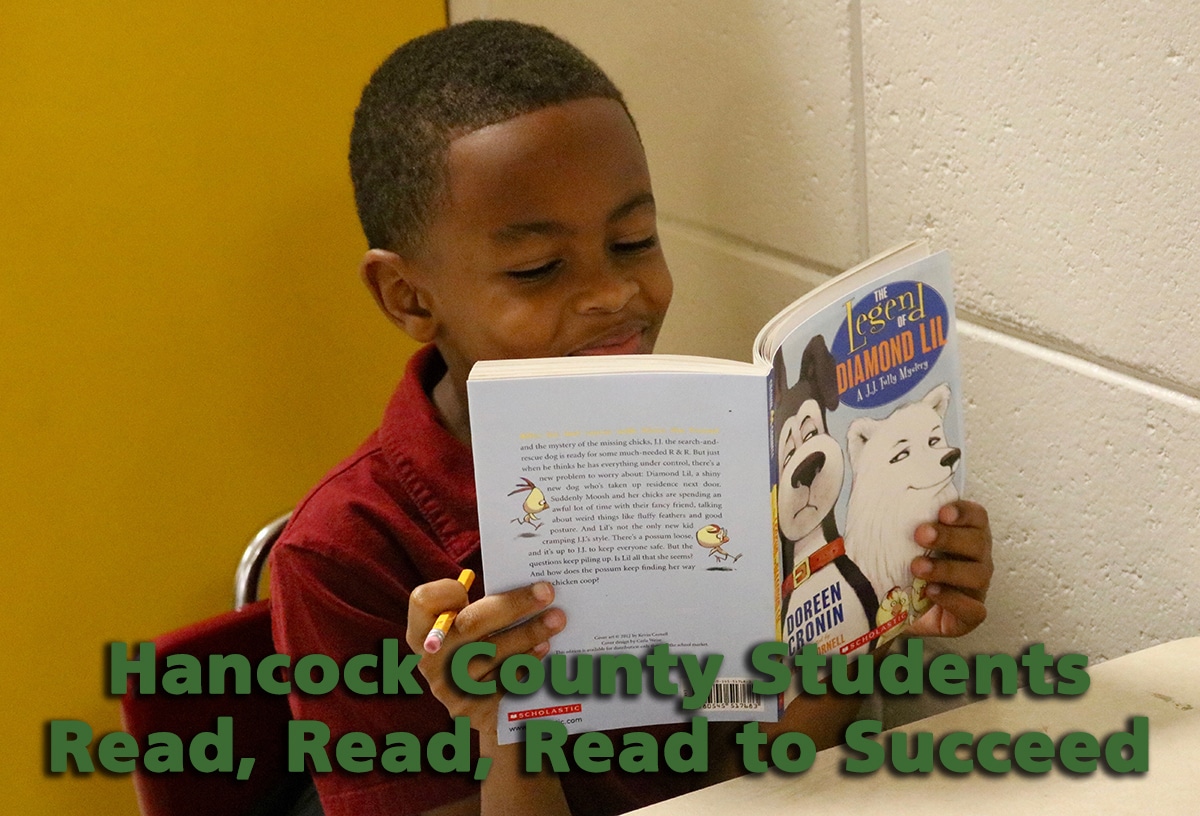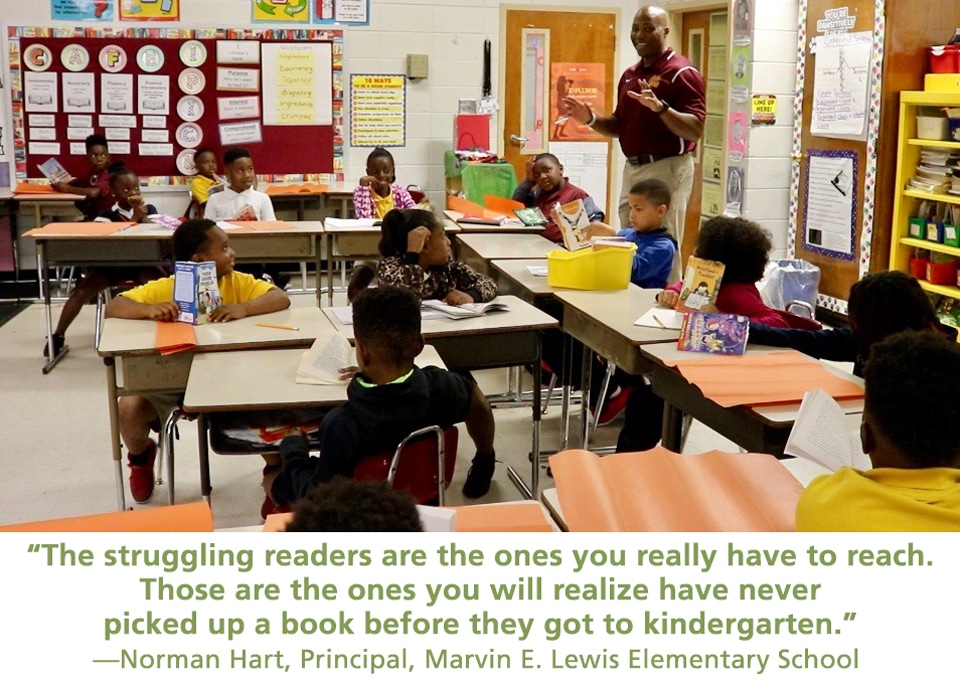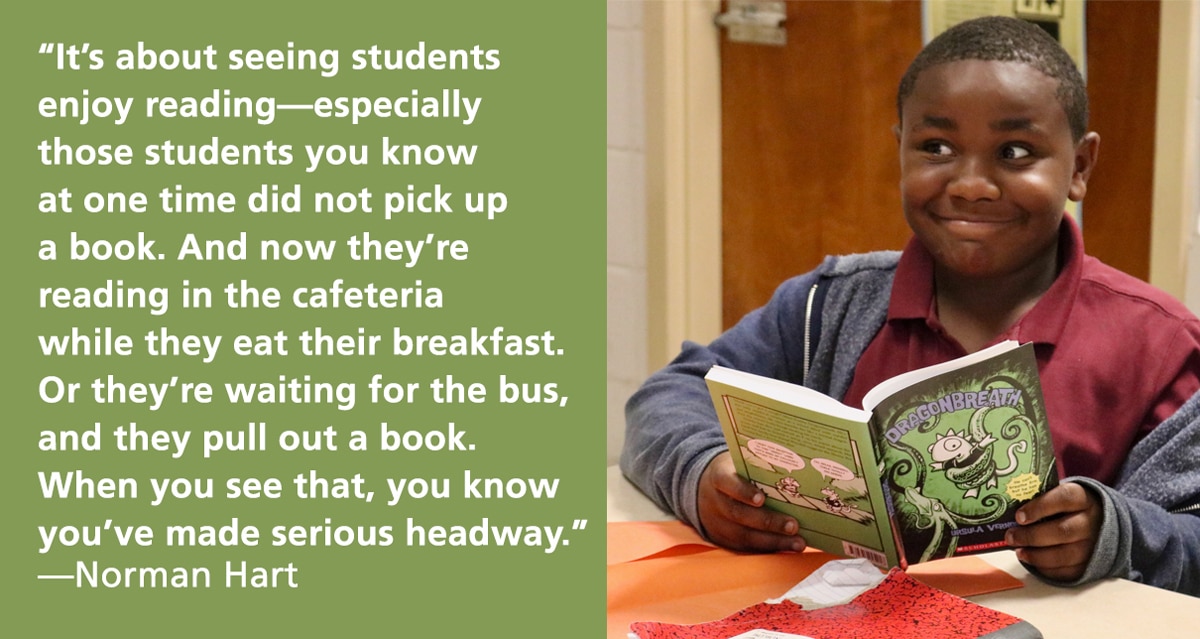Hancock County Students Read, Read, Read to Succeed

Sparta is a small, rural community located in Hancock County, where 48.8 percent of children live in poverty—compared to the state average of 26.7 percent—and 100 percent of elementary-school students receive free school meals.
“There’s a wide gap with issues such as literacy and health that leads to this increase in child poverty,” said Regina Butts, executive director of Family Connection-Communities in Schools of Hancock County.
Georgia Milestones test results in 2015 showed that 58 out of 87 third graders at Marvin E. Lewis Elementary School were reading at the first- or second-grade level. Also, the Governor’s Office of Student Achievement (GOSA) school report showed that only 33 percent of third graders in Hancock County were reading at or above the grade-level target, compared to 67 percent for the state.

“Reading is a learned behavior. If it’s not started early, it’s hard for you to catch onto it later in life,” said Norman Hart, principal at M.E. Lewis. “The struggling readers are the ones you really have to reach. Those are the ones you will realize have never picked up a book before they got to kindergarten. They’ve never been read to. You’ve got this kid coming to school—and he’s got to be reading and writing before he leaves kindergarten.”
Hancock County and other Georgia Family Connection Early Childhood Health and Education (EC-HEED) cohort Collaboratives are working to ensure that youth succeed in school by implementing strategies that address the needs of children birth to age 8 and their families.
Several partners focused on improving childhood literacy are now participating on the Hancock County EC-HEED strategy team. Ferst Foundation for Childhood Literacy, for example, is providing children with age-appropriate books in their homes from birth through age 5, and the Hancock County Health Department is encouraging parents to register for the free books. WJBF News Channel 6 also hosts a book drive that benefits the M.E. Lewis Media Center.
While the EC-HEED cohort supports children before they enter school through combined efforts with the Early Head Start and Head Start Program, like creating a media center to provide age-appropriate books and technology resources, the strategy team also made the data-driven decision to focus additional efforts on school-age children to increase third-grade reading proficiency.
During the 2015-16 school year, funds were used to implement the Reading Street Literacy Program in grades one through three for comprehensive coverage of language arts. Additional funds were allocated in 2016-17 to introduce students in grades K through five to the Lexile Framework for Reading—a scientific way to match readers with text that’s at an appropriate level of difficulty.
“The Lexile Framework allows students to become more involved in their reading level,” explained Butts. “It’s brought about an awareness for students—and their parents—of where they are and where they need to be.”
When Hart arrived at M.E. Lewis in 2015, he met with parents to share data and discuss the steps necessary for students to thrive. This led the school to introduce a model called “Read, Read, Read to Succeed,” which encourages students to read daily, both at school and at home.
The messaging is everywhere—from Hart’s monthly newsletter, to the school’s morning announcements, to the marquee outside the building. The principal worked to get buy-in on the “Read, Read, Read to Succeed” philosophy from the entire school community—including custodians and cafeteria workers.
“That’s something that, as a leader, you have to just keep out there in front. It has to be a part of you,” said Hart, who regularly shares the school’s progress with parents during successful events like Curriculum Night. “Everybody likes to see growth. A lot of parents have to see that it’s working before they actually jump in. I always tell the parents, ‘Guys, give me 15 minutes. Give your son or daughter 15 minutes a day to read.’ ”
The Lexile system allows students, parents, and educators to frequently observe benchmarks that signify substantial strides in each child’s reading journey. Signs of growth are celebrated, which in turn builds self-esteem. M.E. Lewis Elementary School has already seen an overall improvement in third-grade Lexile scores. In 2015, only 20 percent of students reached 650—considered at grade level—compared to 28 percent in 2016.
Velma Hunt has watched her son, Zion, a third grader at M.E. Lewis, progress as a reader since she signed him up to receive free books through Ferst Foundation when he was 4 years old—something she said makes children feel important, while improving their reading skills and nurturing their imaginations.
“Zion received a crown last Friday in class for being most improved in reading, and it just really made him feel good that he’s not struggling like he used to,” said Hunt. “I think the books he started out with in Head Start helped him to be where he is now.”
To successfully implement the Lexile Framework, the teaching staff at M.E. Lewis took part in extensive training with their Regional Educational Service Agency (RESA), as well as the CAFÉ Literacy System, which concentrates on the four key components of successful reading:
- comprehension,
- accuracy,
- fluency, and
- expanding vocabulary.
“Once you’ve identified a weakness, you have to run a diagnostic on it just like a doctor and say, ‘Okay, this is the medicine that’s needed,’ ” said Hart, who meets weekly with grade-level chairs to discuss data, issues, and challenges. “That’s the training our teachers had to have.”
The school also participates in GOSA’s Reading Mentors Program, which provides on-site language and literacy specialists to assist teachers and administrators in building capacity to effectively provide best practices in reading and literacy instruction in K-3 classrooms.
Extensive professional development has helped the M.E. Lewis staff address some of the challenges students and their families face, including simply making the trek to the school or library from their isolated rural homes.
 Students are allowed to check out books over the summer break, and the school’s doors remain open during that time so students can pick up books or access computers. Additionally, the local library aims to engage children with a summer reading club, working with local businesses to create prize packs and host a party to celebrate completed reading logs.
Students are allowed to check out books over the summer break, and the school’s doors remain open during that time so students can pick up books or access computers. Additionally, the local library aims to engage children with a summer reading club, working with local businesses to create prize packs and host a party to celebrate completed reading logs.
“Family Connection does a great job of helping us promote literacy programs and getting the parents involved to get kids to the library,” said Hancock County Library assistant librarian Darice Davis. “We appreciate that because, through Family Connection, we get new patrons coming into the library who we don’t usually see, and we get to encourage more kids to read, which helps us circulate more books throughout the county.”
Educators focus on helping students find reading material that’s suited to their Lexile levels and encourage children to read whatever interests them, including magazines and comic books. Students are also asked what kind of books they want to see in the library.
“You have to get people to understand that reading is not something that should be a chore. It should be something you enjoy,” said Hart. “If we want to keep kids authentically engaged in reading, they should have a choice. Now children are checking out more books and the library is a very cool place. We’re excited about that.”
Hancock County’s elementary school students’ academic growth in 2016 was higher than 76 percent of schools in the state. From 2015 to 2016, Hancock County’s elementary school students’ Georgia Milestones testing saw a 13.6 percent increase for students achieving developing learner or above on English Language Arts from 33.3 percent to 46.9 percent. Also in 2016, third graders achieving proficient reader or above at M.E. Lewis significantly improved to 17.2 percent from 10.3 percent in 2015.

While these statistics show that the hard work the students, parents, and staff are putting into literacy efforts at M.E. Lewis is paying off, Hart measures the school’s success by simply walking down the halls.
“It’s about seeing students enjoy reading—especially those students you know at one time did not pick up a book,” he said. “And now they’re reading in the cafeteria while they eat their breakfast. Or they’re waiting for the bus, and they pull out a book. When you see that, you know you’ve made some serious headway.”
While it’s clear that the students are becoming more confident readers, it’s also evident that parents like Velma Hunt are committed to keeping their children on that path.
“My hopes for my son are for him to grow, be inventive, be nice to people, and not be scared to learn, because knowledge is power,” said Hunt. “And where there is knowledge and there is power, the possibilities are endless.”
